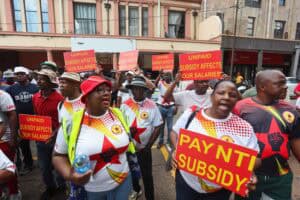Eleven years on and no one has been held responsible for the deaths of 34 Marikana workers and 10 others, including police officers and security guards.

While it has been 11 years since the Marikana massacre, many still feel there has not been much change or improvement in the lives of mine workers and their families.
The Association of Mineworkers and Construction Union (Amcu) yesterday led the 11th commemoration, with thousands of people, including members of the union, in attendance.
In 2012, 34 mineworkers were gunned down by the police in front of TV cameras after a six-month-long strike for higher wages.
The miners had set up camp on a koppie in Wonderkop, near the Lonmin mine in North West.
The mineworkers occasionally entered into discussions with the police but they remained steadfast in their strike action and on 16 August, a full-frontal attack was launched on them resulting in the death of 34 workers.
SA Police Service bosses claimed its officers opened fire in self-defence, after the mineworkers attempted to attack them using machetes, spears and clubs.
The official number of people killed was confirmed by then-police commissioner General Riah Phiyega, weeks after the incident.
Ten other people, including two police officers and two security guards, were killed days earlier.
Many supporters and members of Amcu were draped in green, white and yellow regalia in support of the deceased.
However, the union and residents said yesterday there had not been much change since the incident.
A Wonderkop resident, Dumisa Ndzelu, said the day had lost its value and while Amcu representatives spoke of their fight for workers, the real truth was that “Amcu has failed” them.
Speaking to The Citizen at her home, Ndzelu said she did not see any purpose in joining Amcu in the commemoration as it has continued to fail its members.
She claimed that her husband, along with 57 other workers who worked at the Rowland shaft under Sibanye Gold Mine, did not receive any compensation after being laid off work last October.
Sounding defeated, Ndzelu said they have been struggling, and survived on handouts as there were no jobs.
“I am a mother of two boys and I am battling every day to take care of my family. There is no food here yet Amcu claims it fights for the workers.
“Every year they come here and preach the same thing but there are no changes. It is not only me, many other residents and members are complaining,” she said.
“They want us to call them a union that cares about its members, but they don’t. They have become a disgrace. That is all I can say about them.”
While no prosecutions have been made, the National Prosecution Authority (NPA) said in statement it was still committed to deal with criminal proceedings related to the Marikana deaths.
NPA North West regional spokesperson Henry Mamothame said the Marikana Commission of Inquiry made recommendations for law enforcement entities to institute criminal charges against the perpetrators, where evidence is available.
“And it also recommended that criminal investigations be instituted to bring the perpetrators to book,” he said.
“Having noted the litigious nature and complexity of the incident, all role players have been in constant consultation to fast track the process of completing investigations and where possible institute criminal charges.”
Political analyst Professor Ntsikelelo Breakfast said it was important to note the day was part of South Africa’s history and the worst part was – inequality had still not been done away.
“It also shows our democracy will never flourish if we continue to have disparities between the haves and the have-nots.”
He said the fact that there had not been any prosecutions yet reflected that there was a cover-up.
“No one has been held accountable, besides the former police commissioner. The people in upper echelons have been exempted from responsibility and the ones made to bear the brunt are the ones in uniform. The decision must have come from those outside of uniforms,” he said.
“The decision to shoot at the workers was not issued by (Riah) Phiyega. It must have been a politician. For instance, President Cyril Ramaphosa on record confirmed that he was the one who wrote to the minister (since he had shares at Lonmin) to put pressure on the situation, but he was not held accountable.”
Amcu member Codesa Joyini from Eastern Cape said this day did not receive the respect it deserved. He said it should be honoured as a public holiday, like the 16 June Youth Day.
Support Local Journalism
Add The Citizen as a Preferred Source on Google and follow us on Google News to see more of our trusted reporting in Google News and Top Stories.






